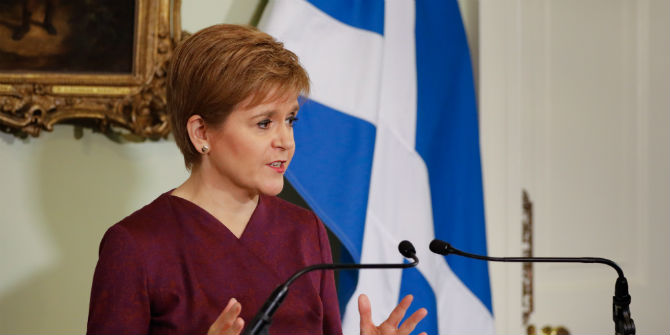 The UK seems to be rapidly heading for one of the most tangled and tumultuous political periods in modern history as Brexit nears its apogee, writes Colin Talbot. Whether you think we’re headed to Valhalla or Ragnarok, the constitution, law, conventions and politics are all set to be tested in ways rarely seen. In this blog, he presents a quick guide to some of the institutions that will be severely tested over the next days and weeks.
The UK seems to be rapidly heading for one of the most tangled and tumultuous political periods in modern history as Brexit nears its apogee, writes Colin Talbot. Whether you think we’re headed to Valhalla or Ragnarok, the constitution, law, conventions and politics are all set to be tested in ways rarely seen. In this blog, he presents a quick guide to some of the institutions that will be severely tested over the next days and weeks.
Constitution
The UK is fairly unique amongst big, advanced, democracies in not having a written constitution. It’s not that there aren’t any written ‘bits’ of a constitution, on the contrary, there are many, many, bits – but there is a not a single document. And many of the written bits and pieces that make up our ramshackle constitutional arrangements have highly dubious status, and some aren’t even written down at all.
It’s sometimes claimed that everything from Magna Carta (1215), the Petition of Right (1628), the Parliament Acts (1911 and 1949), Standing Orders of the House of Commons and Lords, Erskine May (first published in 1844), the Fixed Term Parliaments Act (2011 FTPA) etc all form part of our constitution. Some of these are really just historical curios, like Magna Carta. Others have no constitutional or even legal standing (like Erskine May, the so-called ‘parliamentary bible’).
Countries that do have written constitutions – probably the most famous example being the Constitution of the United States of America – also have a special set of rules about how they can be changed. In the USA an amendment can be proposed either by the Congress with a two-thirds majority vote in both the House of Representatives and the Senate or by a constitutional convention called for by two-thirds of the State legislatures (the latter process has never happened).
In the UK, by contrast, a simple Act of Parliament can effectively change the constitutional arrangements (as the 2011 FTPA recently did in quite far-reaching ways). There is a serious debate about whether the various pieces of legislation relating to the UK’s membership of, and departure from, the European Union were ‘constitutional’ in nature. Some would argue, for example, that the 2016 EU Referendum was constitutional in nature and therefore should have required a ‘super-majority’ (as in the USA). This was raised in Parliament at the time but was dismissed on the grounds the Referendum was purely ‘advisory’.
Laws
Laws are in theory much simpler – they just have to be passed through Parliament on simple majorities to become an Act. Except that actually also isn’t true. Law – precedents – can also be effectively made my courts – including now a Supreme Court. These are only supposed to fill in gaps or provide interpretations of laws passed by Parliament, but in practice, they can go further. And whilst the UK remains part of the EU structures some of these decisions will be taken by the ECJ.
The role for the courts in both adjudicating legal disputes and cases and in setting precedents is another fundamental pillar of modern representative democracies. The courts provide a check on both executive and legislative power. An important point to make about both constitutions and laws in a democracy is that they both require what is sometimes called “Losers Consent”. In other words, citizens, and political parties agree to ‘play by the rules’ and if they lose accept the right of the winners to pass laws or, in the case of constitutions, alter them. But “Losers Consent” in democracies is also based on the basic principle that at some point in the future – sometimes the fairly near future – there will be opportunities for the losers to become the winners. Without that democracy would rapidly cease to exist.

Conventions
Conventions are rules of political practice that have evolved over time and are generally accepted by the participants in the political game. Some of them have huge import – for example, the (fairly recent) convention (which exists nowhere in law) that the UK Monarch must act on the advice of Her Prime Minister and Cabinet. Breaking such a convention by the Monarch would provoke a massive constitutional crisis and is unlikely to happen (but not impossible).
Other conventions are far flimsier and are, to coin a phrase, not worth the paper they are not written on. They exist only so long as the participants – and especially the government – want them to. A good example of the latter is the ‘convention’ that Law Officer’s advice to government is not published. This ‘sacred principle’ has been broken by governments when they wanted to – not often, but it has happened.
Another dramatic example comes from the USA. The ‘conventions’ that a US President publishes their tax returns and distances themselves from any business interests whilst in office has been shredded by Donald Trump with the acquiescence of the Republican-controlled Congress.
‘Conventions’ can also be over-ridden by new laws (or constitutional changes). A good example here is the Fixed Term Parliaments Act. Before FTPA there were said to be various conventions about when a government might lose a vote of confidence in the House of Commons, forcing it to resign and call an election (in reality, many of these conventions were fuzzy at best). Since FTPA was passed all such conventions have been superseded by the precise process set out in the Act. Which does not mean there may not be circumstances in which a government – such as the current minority one – might not be forced politically by a major policy defeat to activate the FTPA mechanism to call an election. But they would not be compelled, legally, to do so.
Politics
Which brings us to politics. Conventions only exist as long as there an effective political consensus that they do. Governments may choose to stick to conventions even when they are to the advantage of the Opposition purely because they know one day, they will probably be the Opposition themselves.
But what about when they don’t care? President Trump clearly doesn’t and is riding rough-shod over many conventions that have survived for decades in US government. It’s simply a question of power – if you have enough and don’t care, you can override conventions. You cannot do that with laws or the constitution, as Trump is finding out. The courts have already thwarted various gambits and the new Democrat-controlled House will undoubtedly block from 2019.
The Great Brexit Crisis of 2018/19 may well be about to shake up the UK constitution, laws, conventions and politics in ways we have not seen for a very long time.
This post represents the views of the author and not those of the Brexit blog, nor the LSE.
Professor Colin Talbot (@colinrtalbot ) is a Research Associate at the University of Cambridge and Professor of Government (Emeritus) at the University of Manchester.







This echoes the opinion of Professor Anthony Grayling, a prominent opponent of Brexit.
He argues that the British push for Brexit should not be seen in isolation. It is the inevitable result in a country with no written constitution, instead governed by a whole panoply of vaguely understood conventions.
For example, the referendum, in the legislation setting it up, was clearly indicated as only being “advisory”. The proponents of Brexit suddenly decided the result would be mandatory, when they discovered they had won, if only by a narrow margin in terms of percentage vote.
In the consultations on Brexit policy, everything has been monopolised by the Conservative Party, and it’s DUP allies. There is a Brexit Committee in the Commons led by a Labour MP, but the real power lies with secretive Cabinet committees controlled by the Tory Party.
There has been zero meaningful consultation with the devolved administrations in Scotland, Wales and Northern Ireland.
Professor Grayling has written several article on these and other points for the New European newspaper – http://www.theneweuropean.co.uk .
@Friedrich: “For example, the referendum, in the legislation setting it up, was clearly indicated as only being “advisory” ” You are doubtless right about that being the legislation. However the clear message from David Cameron and Jeremy Corbyn before the referendum was, as I recall, that a leave vote would and should result in the UK leaving the EU. Indeed I’m happy to challenge you to see if you can find any statement from any prominent politician on the Remain side from Labour, Conservatives or Liberal Democrats who, before the referendum, were advocating otherwise. So the idea that the referendum should be mandatory was not something invented by Leavers after the result.
‘But “Losers Consent” in democracies is also based on the basic principle that at some point in the future – sometimes the fairly near future – there will be opportunities for the losers to become the winners.’
This is something the Remainers should bear in mind. It is all very well talking of the sovereignty of Parliament, but a future Parliament might have a Brexit majority. They wouldn’t want such a Parliament to be in a position where it could invoke Article 50 with no need to call a referendum and despite the fact that it attracted only a minority of votes in a general election. Any new precedents that Remainer MPs set now would be applicable to future Parliaments.
I fail to see how this matters for Remainers. If parliament just rescinds the article 50 notice Brexit is cancelled and sure maybe a future parliament decides to invoke article 50 again. So one ends up remaining with the possibility of leaving. If Brexit just goes ahead, one ends up with Brexit and with at some point the possibility of joining again. Why wouldn’t you chose the first one if you are a Remainer?
It is their choice, but effectively every General Election thereafter becomes a surrogate referendum on Brexit where the threshold for Brexit is only 40% of the vote (which is roughly the percentage needed to get a parliamentary majority). Given that Brexiteer voters and MPs will peel off from both the main parties that could be problematic for them, since the Remain vote could be split across the two parties.
Professor Talbot has some serious explaining to do. Why mention the Magna Carta but not the written Constitution of 1688, the English Bill of Rights, which received Royal Assent on 16 December 1689, one wonders. Is this an oversight or just another example of the gross dishonesty on the part of people who know better? Please explain, Professor Talbot. Since the EEC morphed into the EU, England has not been part of either, as per the Constitution in question. Academics, politicians and, not least, this May dictatorial government have some explaining to do.
When someone, claiming above the average intelligence, starts a sentence with “fairly unique”, I am on my guard and disinclined to read further.
Brian Hanks
We need a Pro-EU Party to continually fight for the UK to rejoin the EU. But we should wait first for the EU to document it’s Constitution!